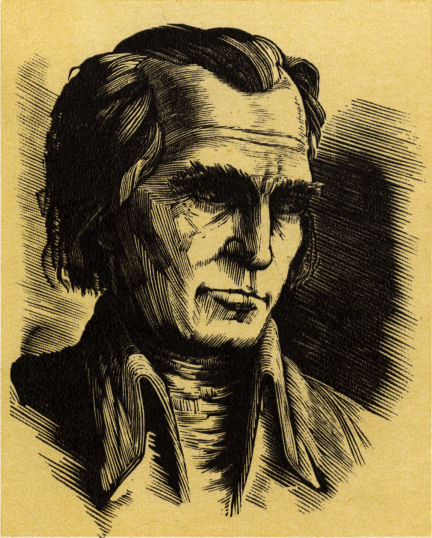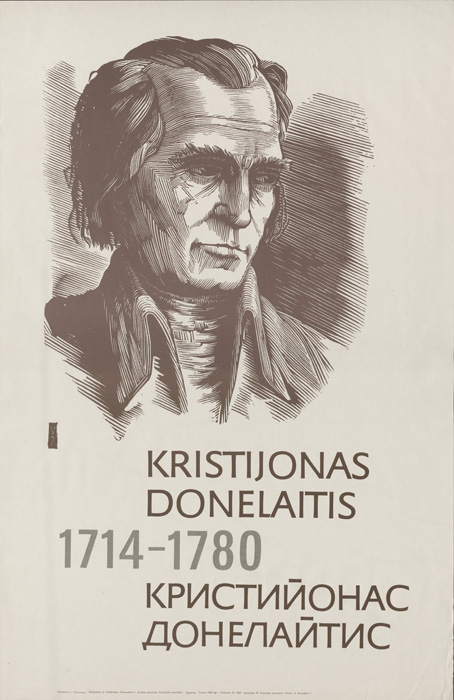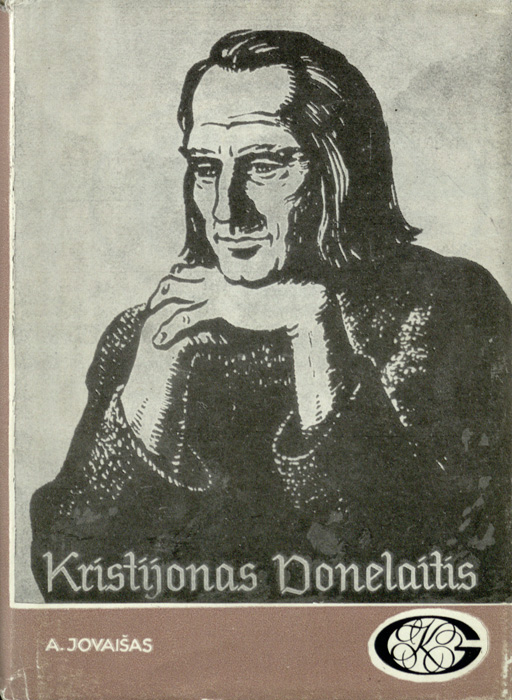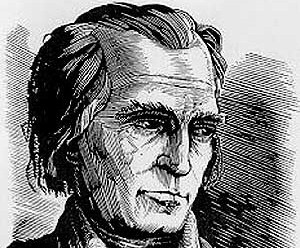Kristijonas Donelaitis
Christian Donaleitis, also Kristijonas Donelaitis ( he called himself Christian Donalitius, born January 1, 1714 at Lasdinehlen Gumbinnen, † February 18, 1780 in Tollmingkehmen ) was a Protestant pastor of a German -Lithuanian community in the East Prussian Tollmingkehmen ( Prussian Lithuania), where he preached 37 years in German and Lithuanian. He wrote poetry in German and was author of the first belletristic works in Lithuanian. He said in addition also Greek, Hebrew and French.
Life
The son of an early death Kölmers ( Yeomanry ) visited as Pauperschüler ( poor fellow ), the renowned Cathedral School ( Kneiphof ) in Königsberg. His brother Frederick was a goldsmith and jeweler in Königsberg. His brother Michael inherited the estate of the deceased father and brother Adam was hoof and armorer.
In Konigsberg Donaleitis studied under pietistic theology professors and visited, founded by the King of Prussia Lithuanian seminar on the conservation of the Lithuanian language in Albert Schulz, on which the future pastor of the many newly established locations were trained in litauischsprachigen communities Prussia.
He worked several years as a cantor and also as a mechanic, where he built pianos and cut glass for thermometers and barometers. He married Anna Regina, the daughter of the town magistrate Ohlefant from Goldap. The marriage remained childless.
Work
Donelaitis ' main work Metai (Eng. seasons) (see below) was created as occasional poetry, probably initially for the design of his sermons.
From Donelaitis some poems are preserved in German language.
He has been called " the first in the Western culture ", " who had written a work of fiction about ordinary people ."
Reception in Germany
At the suggestion of the Prussian minister of culture Wilhelm von Humboldt the Königsberg professor Ludwig Rhesa first published Donelaitis ' work. In a ASSESSMENT OF states:
"He was a great lover of garden art, polishing optical glasses, verfertigte thermometer and barometer, which were famous in the whole of Prussia, built Forte piano, on which he himself played admirably, but even more irritable than music had for him the verschwisterte poetry. Among his posthumous papers, there are Hebrew, Greek, Latin, French and German poems., but his masterpiece is the first time here reprinted poem about the four seasons. , the poet, the densities had become such a natural desire that he too often with his friends in verse correspondirte .... "
Less enthusiastic is the inclusion in his Prussian- Lithuanian compatriots. Friedrich Kurschat judges in 1876:
" Christian Donalitius Littauische seals ..... are present in all of the residency expression written epic and idyllic stories, but when people are not popular because it prosaic everyday life of the people is represented ( in hexameters ), but partly in exaggerated shapes and distorted images what the people will find no pleasure. "
The most recent full German -language paraphrase comes from Hermann Buddensieg (1970). Mid-1960s, sat John Bobrowski ( 1917-1965 ) in the novel Lithuanian Claviere with Donelaitis apart. In 1976 the opera of the same name by Rainer Kunad in Dresden premiere. Excerpts transferred Hans -Ulrich Werner 2002, annotated with reflections on the " Lithuanian " and "German" hexameter, in Perkunas -Verlag.
Metai ( The Seasons )
After many years of collecting and processing until 1818 Ludwig Rhesa published the posthumous Lithuanian seals together with German translation abridged version. 1865 was the linguist August Schleicher in St. Petersburg at the Imperial Academy of Sciences finally the original verses of the Christian Donalitius than first complete edition with a glossary out. During the tsarist era to 1917 Schleicher publication was used among other things as a textbook of Lithuanian to Russian schools and universities. Ferdinand Nesselmann in his work a few years after Schleicher 's complained some Lithuanian translations. In today's Lithuania Christian Donalitius remained relatively unknown until the beginning of the 20th century, is considered Kristijonas Donelaitis there now but as the founder of the Lithuanian national literature.
Even before Klopstock in his Messiah Donelaitis wrote in hexameters. Before him there were in Prussia besides dictionaries and grammars Lithuanian texts only from a religious reason ( Bibles, prayer and hymn books ) and in some oaths. UNESCO added Metai 1977 in the library of literature masterpieces in Europe.
In the translation of Ludwig Passarge, 1894
III. The joys of spring
IV The work of summer
Original extract this passage with linguistic explanations in English:
Poem in German
The God of Darkness
Works
- The Seasons. A Lithuanian epic. Paraphrase and foreword by Hermann Buddensieg, Leipzig, Insel, 1970
- All seals with Lithuanian- German glossary published by Schleicher, St. Petersburg 1865
- The year in four cantos, a rural epic from Lithuanian Christian Donalleitis Königsberg, 1818, edited by Ludwig Rhesa
- Littauische seals, according to Konigsberg manuscripts, edited by GHF Nesselmann, Königsberg 1869
There are several translations of the " Seasons". At least two British, in 1967 and 1985. Two German, 1869 and 1966 (the last published back in 1970 ). And a Swedish 1991.









